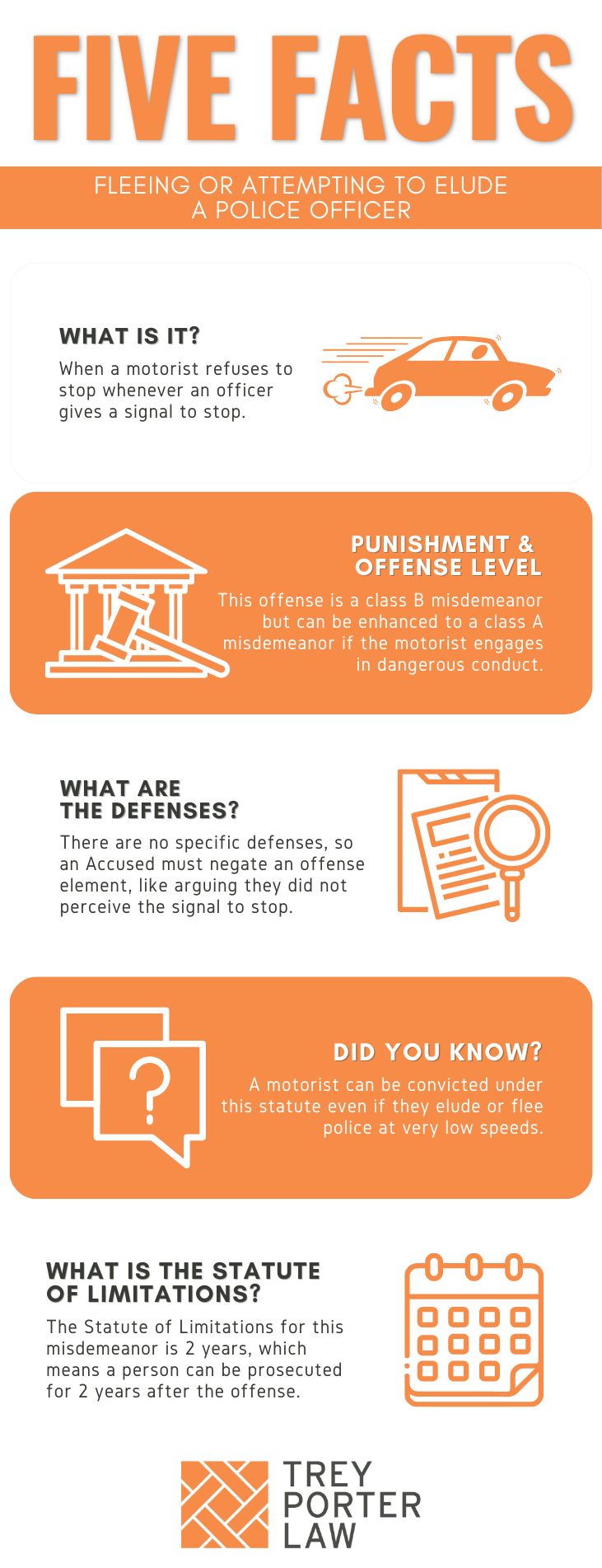WHAT IS FLEEING OR ATTEMPTING TO ELUDE POLICE OFFICER IN TEXAS?
The Texas law against fleeing or attempting to elude police officer prohibits wilfully refusing to stop when a police vehicle gives a visual or audible signal to stop.

WHAT IS THE FLEEING OR ATTEMPTING TO ELUDE POLICE OFFICER LAW IN TEXAS?
Tex. Transp. Code § 545.421. FLEEING OR ATTEMPTING TO ELUDE POLICE OFFICER; OFFENSE.
(a) A person commits an offense if the person operates a motor vehicle and wilfully fails or refuses to bring the vehicle to a stop or flees, or attempts to elude, a pursuing police vehicle when given a visual or audible signal to bring the vehicle to a stop.
(b) A signal under this section that is given by a police officer pursuing a vehicle may be by hand, voice, emergency light, or siren. The officer giving the signal must be in uniform and prominently display the officer’s badge of office. The officer’s vehicle must bear the insignia of a law enforcement agency, regardless of whether the vehicle displays an emergency light.
(c) Except as provided by Subsection (d), an offense under this section is a Class B misdemeanor.
(d) An offense under this section is a Class A misdemeanor if the person, during the commission of the offense, recklessly engages in conduct that places another in imminent danger of serious bodily injury.
(e) A person is presumed to have recklessly engaged in conduct placing another in imminent danger of serious bodily injury under Subsection (d) if the person while intoxicated knowingly operated a motor vehicle during the commission of the offense.
WHAT IS THE PENALTY CLASS FOR FLEEING OR ATTEMPTING TO ELUDE POLICE OFFICER IN TEXAS?
By default, fleeing or attempting to elude a police officer is a Class B misdemeanor, punishable by up to 180 days in county jail.
If a person flees or attempts to elude a police officer and recklessly engages in conduct that places another in imminent danger of serious bodily injury, it is a Class A misdemeanor, punishable by up to one year in jail.
WHAT IS THE PUNISHMENT RANGE FOR FLEEING OR ATTEMPTING TO ELUDE POLICE OFFICER IN TEXAS?
The punishment range for fleeing or eluding a police officer charged as a Class B misdemeanor is up to 180 days in jail, and a maximum $2,000 fine. If charged as a Class A misdemeanor, the punishment range is up to one year in jail, and a maximum $4,000 fine.
WHAT ARE THE PENALTIES FOR FLEEING OR ATTEMPTING TO ELUDE POLICE OFFICER IN TEXAS?
A person charged with fleeing or attempting to elude a police officer may be eligible for probation after a conviction, or deferred adjudication without a conviction, for a period not to exceed two years.
WHAT ARE THE DEFENSES TO FLEEING OR ATTEMPTING TO ELUDE POLICE OFFICER IN TEXAS?
The statute does not authorize specific defenses to fleeing or attempting to elude a police officer. A person accused thereof may attempt to negate at least one of the elements the State must prove at trial.
- What is fleeing from an officer in Texas? Fleeing is anything less than prompt compliance with an officer’s direction to stop.In Lopez v. State, officers saw a defendant speeding, and activated their lights and sirens as the defendant exited the highway. He drove through a neighborhood for 0.6 miles, then parked in his driveway. At trial, he argued he was not accelerating, and did not notice the lights or sirens during the minute while officers were behind him. He was convicted of evading in a vehicle, and the appellate court upheld the conviction. Fleeing slowly is still fleeing.
- Can a person be charged with fleeing or attempting to elude in Texas if the person does not know the officer is attempting to detain or arrest? Texas law requires proof the defendant knew a police officer was attempting to stop him or her. Thus, a police officer must make some show of authority, usually accomplished by overhead lights or sirens.In Duvall v. State, an officer driving on a two-way street saw the defendant speeding in the opposite direction. He turned around, intending to stop the defendant, but did not turn on his overhead lights, and did not catch up to the defendant. The defendant crashed his car, and left the scene before any officers arrived. He was convicted of evading, but the appellate court reversed his conviction. There was no way he could have known the officer was attempting to stop him.
WHAT IS THE STATUTE OF LIMITATIONS FOR FLEEING OR ATTEMPTING TO ELUDE POLICE OFFICER IN TEXAS?
The limitation period for fleeing or attempting to elude a police officer, a Class A or Class B misdemeanor, is two years.
FLEEING OR ATTEMPTING TO ELUDE POLICE OFFICER IN TEXAS
The Texas law against fleeing or attempting to elude requires proof that the defendant be signaled by hand or emergency light, or by voice or siren to stop and that he be pursued by a marked police vehicle that is driven by a uniformed officer with a prominently displayed badge.
TEXAS FLEEING OR ATTEMPTING TO ELUDE POLICE OFFICER COURT CASES
The case law regarding fleeing or attempting to elude police officers in Texas illustrates the statute’s application.
- In Ingram v. State, the defendant was driving without an illuminated license plate. A police officer attempted to stop the defendant’s truck by using an overhead light, but there was no evidence that the officer was driving a marked police vehicle. Because the police officer was not in a marked police car, the evidence was insufficient to support the defendant’s conviction.
- In Perkins v. State, a police officer attempted to stop the defendant for speeding. The officer turned on his sirens after the defendant continued driving for several more blocks before coming to a stop. He was ultimately convicted of fleeing or attempting to elude, and the appellate court affirmed.
















